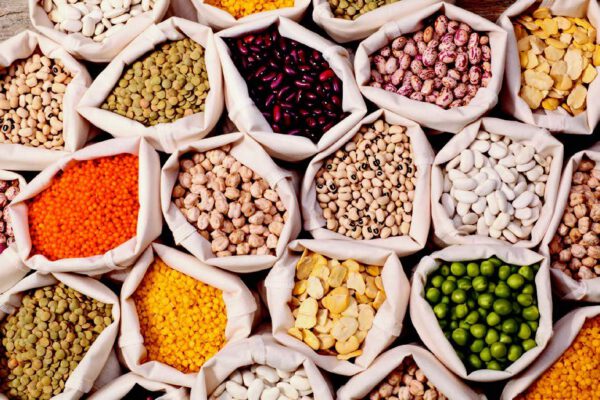Superfoods Don't Exist
But Try These 8 Healthy Foods
What are superfoods? This term means healthy food options that will have a positive impact on your health.
It's important to keep in mind that not a single food will help you drastically change your health.
You will have to better your eating habits and our lifestyle as a whole.
Even though superfoods don't exist, certain foods have more health benefits than others.
Here are 8 healthy food options you should try.
Legumes are plant foods such as beans, lentils, peas, soybeans and others.
They're considered as superfood because they're rich in fiber, protein, b vitamins, iron, magnesium and zinc.
Legumes are naturally low in fat, which makes them an excellent option for muscle growth, fat loss and weight maintenance.
Dark leafy greens vegetables are foods such as: kale, spinach, arugula, Romain lettuce, collard greens, Swiss chard...
These vegetables are a good source of zinc, vitamin K, vitamin c, iron, magnesium calcium and fiber.
They also contain anti-inflammatory compounds that may inhibit the growth of certain types of cancer.
Kefir and yogurt are both fermented products made from milk.
They're high in protein, calcium, potassium, probiotics and b vitamins.
Research has shown that fermented foods such as kefir and yogurt will have major health benefits for your gut health, which plays a big role in your digestion and brain health.
Even though olive oil is calorie tense, it's a primary component of the Mediterranean diet, and it has many benefits when consumed in moderation.
It is rich in healthy monounsaturated fats, antioxidants and can help reduce inflammation.
Studies show that it may also help lower your risk of heart disease.
Use olive oil has a healthy seasoning or low-temperature cooking oil (try canola oil for high-temperature cooking).
Eggs had a bad reputation due to their high cholesterol content.
However, research has shown that it isn't the cholesterol alone that increases cardiovascular disease risk, but foods that contain trans and saturated fats.
Eggs are high in protein, antioxidants, selenium, vitamin A, B vitamins and zinc.
Don't hesitate to eat eggs regularly.
Garlic is highly nutritious and tasty. It's a good source of fiber, selenium, vitamin B6 and vitamin C.
Active compounds in garlic can help reduce blood pressure.
Studies show that garlic can also help improve cholesterol levels and lower risk of heart disease.
Add one to two gloves of garlic to your meals to make them even more tasty.
Nuts and seeds are high in fiber, protein and micronutrients.
Here are common nuts and seeds: walnuts, almonds, pecans, cashews, hemp seeds, sunflower seeds, pumpkin seeds...
Nuts and seeds are popular due to their antioxidant properties and their omega-3 (ALA) fatty acid content.
They can help you keep your heart healthy and strong.
They're caloric dense food that should be consumed in moderation despite their benefits.
Try to eat a handful of nuts and seeds a day
Fish is rich in protein, healthy fats (omega-3 fatty acids: EPA & DHA) and has various health benefits such as: reducing risk of heart disease, diabetes and inflammations.
Try fish like salmon, tuna steak, sardines, herring, wild trout.
Fish and other seafoods can be high in heavy metals, so try to limit your fish consumption to one to three servings per week.
- Superfoods don't exist
- Certain foods have more health benefits than others
- Legumes are high in protein and fiber, try beans or lentils
- Give yogurt & kefir a try to improve your gut health
- Use olive oil for low-temperature cooking and seasoning
- Try to consume eggs regularly, they're rich in protein and micronutrients
- Add garlic to your lunch and dinner, it's tasty and can help reduce blood pressure
- Try to eat a handful of nuts and seeds regularly
- Add more fish to your diet, they're high in healthy fats
Frequently Asked Questions
Superfoods are often marketed as nutrient-rich foods that offer exceptional health benefits. However, the concept of superfoods is more of a marketing term rather than a scientifically backed category. No single food can drastically change your health; a balanced diet and healthy lifestyle are key.
Instead of focusing on superfoods, consider incorporating a variety of nutrient-dense foods like legumes, dark leafy greens, and fermented dairy products like yogurt and kefir into your diet. These foods are rich in essential nutrients and can support overall health.
Dark leafy greens such as kale and spinach are excellent sources of vitamins and minerals like vitamin K, vitamin C, and iron. They also contain anti-inflammatory compounds that may help reduce the risk of certain cancers.
Yes, fermented foods like yogurt and kefir are rich in probiotics, which are beneficial for gut health. They can aid in digestion and support brain health by maintaining a healthy balance of gut bacteria. Learn more about improving gut health in our article Improve your Gut Health and Achieve Your Fitness Goals.
Olive oil is a healthy choice when used in moderation. It's rich in monounsaturated fats and antioxidants, which can help reduce inflammation and lower the risk of heart disease. For high-temperature cooking, consider using oils with higher smoke points like canola oil.
You can add legumes to soups and salads, use dark leafy greens in smoothies or as a side dish, and drizzle olive oil over salads or use it for low-temperature cooking. Eggs are versatile and can be included in breakfast dishes, while garlic can enhance the flavor of various savory meals.
Eggs were once thought to raise cholesterol levels significantly, but research shows that dietary cholesterol in eggs does not have the same impact on blood cholesterol as once believed. It's more important to limit foods high in trans and saturated fats. For more insights, check out Debunking 7 Common Nutrition Misconceptions to Optimize Health.
